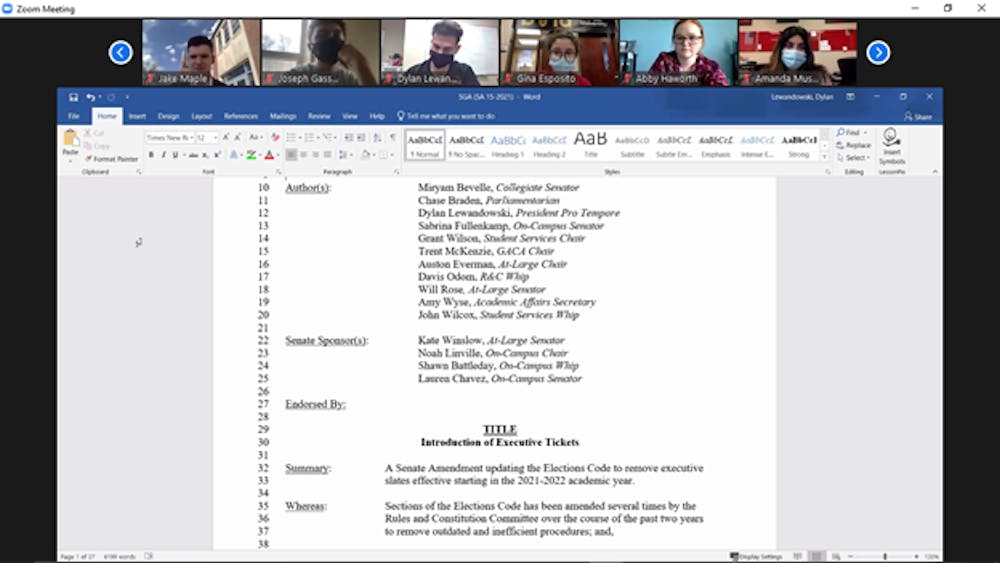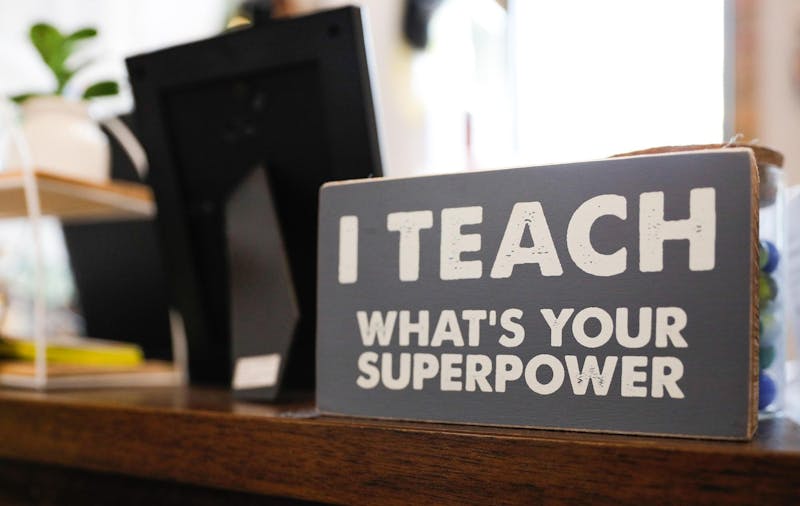At its final meeting of the 2020-21 legislative session, Ball State’s Student Government Association (SGA) passed an amendment to introduce executive slates in future elections and President Connor Sanburn gave his last “State of the Senate” address.
“State of the Senate”
Sanburn updated the senate on some of Bold’s platform points — SGA’s partnership with the Counseling Center, building accessibility and awareness of Safe Zone training and the heated bus stations initiative.
Sanburn said the Counseling Center partnership was completed by a virtual event focused on combatting anxiety March 24. Sanburn said the turnout “could have been a bit better,” but the event still provided practical information. He said he is advocating for a fall semester event on mental health first aid certification, which he is trusting to the 2021-22 slate-elect Strive to lead.
“We [the Bold slate] feel that [Strive’s] points push for some more mental health resources and awareness, and this team can put forth a proper effort,” Sanburn said.
He also discussed SGA’s efforts to build accessibility and awareness for Safe Zone training. Sanburn met with two members of the Counseling Center and confirmed t-shirts will be distributed at the next Trans Safe Zone training event.
“The whole goal is to build the ability and accessibility of the program, getting more students involved and just starting a conversation with anyone who walks by and sees it on their shirt,” Sanburn said.
The last platform point he addressed was about heated bus stations, which he said Chief Administrator Gina Esposito has been working to propose to the university administration.
Sanburn said Bold has not been able to achieve the point this school year, but has created an in-depth proposal they hope to be implemented throughout campus after they leave office. After receiving feedback from the administration, Bold will make final changes and send the proposal to the Facilities and Planning Management office.
Sanburn also reminded senators about the upcoming study day on April 14 and said SGA will be sponsoring food trucks on campus that day.
He ended his “State of the Senate” address by reminding senators they should be involved in SGA “not for [their] own personal interests, but to fight for the student body.”
Introducing new executive slates
After Sanburn’s address, senators looked at an amendment to create new executive slates in future elections, which was first introduced at the March 31 meeting.
If passed, the amendment will allow presidential and vice presidential candidates to run on a ticket together and SGA will appoint and vote on chief administrator and treasurer candidates from an internal election within the senate.
RELATED: Ball State SGA introduces five amendments, passes graduation cords amendment
Senator Conor Dailey proposed an amendment to the amendment, saying treasurer and chief administrator tickets should be voted on separately by the student body, rather than the positions being appointed after the president and vice president are elected.
Senator Trent McKenzie opposed Dailey’s amendment and said the legislation authors worked with feedback they received after proposing the amendment to abolish slates at the Feb. 17 meeting.
“What does a treasurer campaign on? It’s the same reason why we changed it because originally we had treasurer and chief administrator running independently on their own ticket,” McKenzie said. “The very reason why people were arguing against the original amendment was ‘What do these even look like? How do they get campaign visibility?’”
The amendment to the amendment failed 16-20, with two abstentions.
Senators argued SGA is capable of choosing the treasurer and chief administrator because they are the voice for the student body, and ultimately, everything they do should be for their constituents.
The amendment passed 31-6, with one abstention. The change wil go into effect for the spring 2022 elections. A previous version of this amendment that proposed to abolish slates was vetoed by Sanburn.
Minimum voter turnout amendment
Senators also looked at an amendment to create a minimum voter turnout for future SGA elections. Voter turnout is historically low at Ball State compared to other colleges, senators said, with under a quarter of the student body voting in the elections on average.
If passed, this amendment would require a minimum student voter turnout of 10 percent of the student population in each election, and if that is not met, SGA senators will have the power to nominate members to serve as the executive slate.
The authors argued if a slate cannot get at least 10 percent of the student body vote in an election, it is not a true representation of the student population.
After passing an amendment to create a new executive slate and a new elections process, most senators did not see why this amendment would be proposed at this meeting when they are unsure how the new system will work in the future.
The amendment failed to meet the two-thirds majority by a vote of 22-17, with one abstention.
Other business
SGA voted on five amendments proposed at the March 31 meeting.
Senators passed the amendment to create a formal president pro tempore election process for future elections 35-0, with two abstentions.
The amendment to require senators to submit amendments to legislation before SGA meetings passed 31-4, with three abstentions. Senators argued when this isn’t done, reading and voting on legislation becomes confusing.
The amendment to provide the opportunity for more communication with the finance committee before budget requests also passed 30-7. McKenzie, author of the amendment, said budget requests will be more transparent after this discussion before proposing requests.
Senators also passed the amendment allowing committees to remove members if most members believe those individuals aren’t contributing to the group by a vote of 35-2, with one abstention.
The final amendment senators voted on was to make the SGA elections commissioner a member of the executive cabinet.
Authors of the amendment wrote the elections commissioner should be a member of the cabinet because the commissioner “plays a pivotal role” in SGA elections. The amendment passed 33-2, with three abstentions.
Dailey also created a senate order recognizing Esposito for the work she did during the student trustee selection process.
SGA will not meet next week because of the scheduled study day. The Strive slate will be inaugurated April 21.
Contact Maya Wilkins with comments at mrwilkins@bsu.edu or on Twitter @mayawilkinss.





The Daily News welcomes thoughtful discussion on all of our stories, but please keep comments civil and on-topic. Read our full guidelines here.